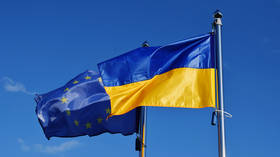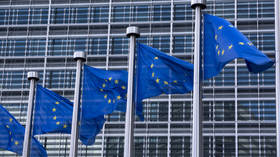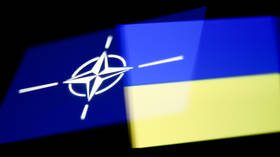Ukraine seeks ways to get more EU money

Ukraine will need to learn from Poland how to use EU money “in such a way that they give you even more,” Ukrainian Foreign Minister Dmitry Kuleba said in an interview, published soon after his country received EU candidate status.
Speaking to news outlet Levy Bereg, Kuleba cited a recent conversation with a counterpart from “a very influential European country,” who said he had realized for the first time that the bloc is considering accepting such a “huge country.” The last nation of similar size to join the bloc was Poland, Kuleba’s counterpart noted.
Responding to a comment by the interviewer that Poland is still the largest recipient of EU subsidies, the Ukrainian foreign minister said, “this logic is correct from the point of view of a Ukrainian consumer: Europe, money...”
“By the way, Poland was not flooded with money, Poland learned to take European money and use it in such a way that they give you even more. And this is why we in Ukraine need to learn at the local level, because that’s where the money should go.”
Kuleba added that it is difficult “to find the right argument to explain to every skeptic” why Ukraine should be granted EU candidate status now, saying the decision to do so has meant “a real psychological break” for the EU leaders, as no one in the bloc talked seriously about Kiev’s ambitions for the last 30 years.
The foreign minister dismissed claims that candidate status will not lead anywhere, noting, “I see how mechanisms for working with Ukraine, as a future member of the European Union, are already being deployed at the level of the European Commission.”
According to Kuleba, the European Commission is “beginning to reflect” how Ukraine’s accession will impact the bloc, how many deputies will be needed in the European Parliament, and how Ukrainian agriculture will influence EU agricultural policy.
“The second thing I see is how the doors are really opening in the European Union to include us in the internal market. This is the zeroing of rates on imports, this is also visa-free for transport. The process goes in that direction,” he said.
At the same time, the bloc itself will need reform, Kuleba noted, explaining that he is looking at accession not from the point of view that “we are so big and we will ask a lot,” but from a political perspective: “how can a tandem of, for example, Ukraine and Poland, change the balance of power in the European Union itself.”
“This is a completely different reality,” Kuleba said, adding that the reforms which have already begun are “mega cool.”
“We, as the Ministry of Foreign Affairs, must ensure that Ukraine’s accession to the EU takes place on the most favorable terms.”
Kuleba’s remarks come a few days after European Commission President Ursula von der Leyen said that Kiev needs to implement more reforms and make new institutions actually work, if it wants to progress towards EU membership.
Last month, Belgian Prime Minister Alexander De Croo signaled that granting Ukraine EU-candidate status is an important “symbolic message” to support Kiev amid its ongoing conflict with Russia. Actual EU membership, however, is still “many years” away, and the country must first meet European standards, he said.
Russian Foreign Ministry spokeswoman Maria Zakharova claimed that the European Council’s decision to grant EU candidate status to Ukraine and Moldova proves that the bloc’s goal is to ‘contain’ Russia.
In June, Russian President Vladimir Putin said Russia has no objections to Ukraine joining the EU as, unlike NATO, it is not a military bloc.
However, he pointed out that the country would require a lot of financial aid to meet the Brussels’ standards and warned about the risk of Ukraine becoming “a sort of semi-colony.”














